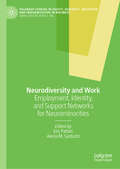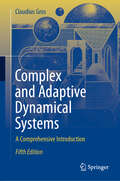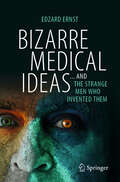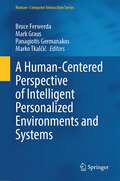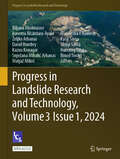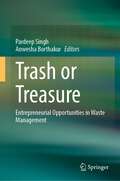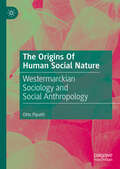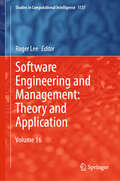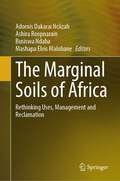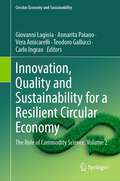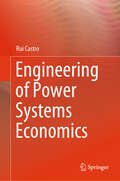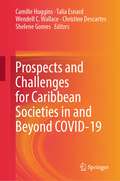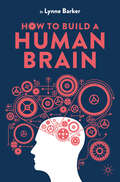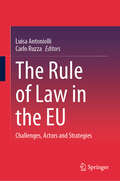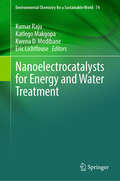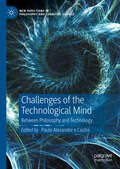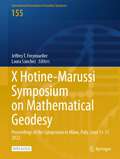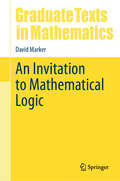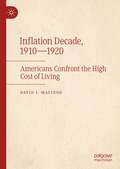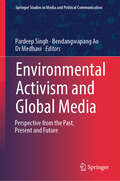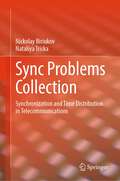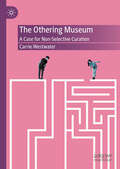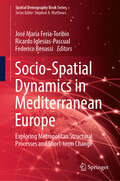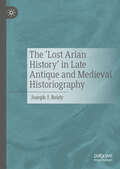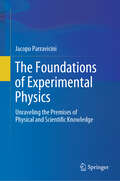- Table View
- List View
Neurodiversity and Work: Employment, Identity, and Support Networks for Neurominorities (Palgrave Studies in Equity, Diversity, Inclusion, and Indigenization in Business)
by Eric Patton Alecia M. SantuzziThis interdisciplinary work explores creating more inclusive workplaces around neurodiversity. It focuses on how organizations can promote true inclusion for neurominorities, a large segment of the emerging workforce while underlining the difficulties as well as the strength-based characteristics faced by this population.Beyond social, learning or communication challenges, neurominorities are often highly intelligent, honest, authentic, hyper-focused, innovative, skilled in various forms of perception, reliable, and resilient. Discovering ways for true inclusion can add value to organizations, helping all employees to learn and develop as colleagues while also helping neurominorities fulfill the goals of achieving dignity, respect, independence, and flourishing through work. This volume connects neurodiversity to disability in the workplace and examines the factors that contribute to the successful employment and integration of neurodiverse workers, including the transition from school to the labor market. It also highlights barriers and challenges faced by neurominorities. This book will appeal to scholars across business and the social sciences looking to better understand how neurodiversity should be addressed in organizational contexts. The multidisciplinary approach will accelerate management research and practices by providing insights already captured across a wide variety of disciplines, rather than prompting management researchers to build upon what currently exists solely in the management literature
Complex and Adaptive Dynamical Systems: A Comprehensive Introduction
by Claudius GrosThis textbook offers a comprehensive introduction to the concepts underpinning our modern understanding of complex and emergent behavior. Mathematical methods necessary for the discussion are introduced and explained on the run. All derivations are presented step-by-step. This new fifth edition has been fully revised and includes a new chapter, a range of new sections, figures and exercises. The Solution chapter has been reorganized for clarity.The core aspects of modern complex system sciences are presented in the first chapters, covering the foundations of network- and dynamical system theory, with a particular focus on scale-free networks and tipping phenomena. The notion of deterministic chaos is treated together with bifurcation theory and the intricacies of time delays. Modern information theoretical principles are discussed in further chapters, together with the notion of self-organized criticality, synchronization phenomena, and a game-theoretical treatment of the tragedy of the commons. The dynamical systems view of modern machine learning is presented in a new chapter.Chapters include exercises and suggestions for further reading. The textbook is suitable for graduate and advanced undergraduate students. The prerequisites are the basic mathematical tools of courses in natural sciences, computer science or engineering.
Bizarre Medical Ideas: ... and the Strange Men Who Invented Them
by Edzard ErnstThis book focuses on the individuals who invented specific forms of alternative medicine. Examples are Hahnemann (homeopathy), Still (osteopathy), Schulz (autogenic training). In total, about 40 such personalities are included in the book. They have all led unusual lives, and the book explores their journey towards their inventions. Certain characteristics seem to emerge: · They are all male! · Many originated from Europe · Most of them are white · Many gave their name to the therapy · Many inventions are relatively recent · Many inventors are not doctors · Most inventors claim to have found a panacea · Many adhere to vitalistic ideas · Almost all of the inventors are fully convinced of their invention · Inventions are often based on personal experience · The inventions tend to be implausible even by the standards of their time The book explores all these themes and, where appropriate, contrasts them with the corresponding situation in conventional medicine.
A Human-Centered Perspective of Intelligent Personalized Environments and Systems (Human–Computer Interaction Series)
by Marko Tkalčič Panagiotis Germanakos Bruce Ferwerda Mark GrausThis book investigates the potential of combining the more quantitative - data-driven techniques with the more qualitative - theory-driven approaches towards the design of user-centred intelligent systems. It seeks to explore the potential of incorporating factors grounded in psychological theory into adaptive/intelligent routines, mechanisms, technologies and innovations. It highlights models, methods and tools that are emerging from their convergence along with challenges and lessons learned. Special emphasis is placed on promoting original insights and paradigms with respect to latest technologies, current research trends, and innovation directions, e.g., incorporating variables derived from psychological theory and individual differences in adaptive intelligent systems so as to increase explainability, fairness, and transparency, and decrease bias during interactions while the control remains with the user.
Progress in Landslide Research and Technology, Volume 3 Issue 1, 2024 (Progress in Landslide Research and Technology)
by Irasema Alcántara-Ayala Kyoji Sassa Matjaž Mikoš Željko Arbanas Binod Tiwari Kazuo Konagai Shinji Sassa Snježana Mihalić Arbanas David Huntley Huiming Tang Maneesha V. Ramesh Biljana AbolmasovThis open access book provides an overview of the progress in landslide research and technology and is part of a book series of the International Consortium on Landslides (ICL). The book provides a common platform for the publication of recent progress in landslide research and technology for practical applications and the benefit for the society contributing to the Kyoto Landslide Commitment 2020, which is expected to continue up to 2030 and even beyond to globally promote the understanding and reduction of landslide disaster risk, as well as to address the 2030 Agenda Sustainable Development Goals.
Trash or Treasure: Entrepreneurial Opportunities in Waste Management
by Pardeep Singh Anwesha BorthakurIn this book, we have contributions from experts working on diverse aspects of waste management and waste entrepreneurship with an aim to contribute toward a holistic understanding of the existing and forthcoming waste handling challenges. Waste entrepreneurship refers to the practice of creating and operating businesses that aim to address the problem of waste management. It signifies businesses that are dedicated to finding innovative solutions for managing waste and plays a crucial role in building a sustainable future. Waste entrepreneurs identify waste as a valuable resource and use state-of-the-art tactics to reduce, reuse, recycle, and re-purpose it. By developing new technologies, services, and products that help reduce waste and recycle materials, they can create new economic opportunities while simultaneously reducing the environmental impact of waste. The primary audience of this book are researchers (from a wide range of disciplinary backgrounds) working in the field of waste management (especially E-waste, Plastics, Paper and Cardboard Waste, Organic Waste, and Construction and Demolition Waste) and environmental sustainability. This book also contains descriptions of various facets of waste entrepreneurship from different countries which will be helpful for different entrepreneurs looking for business opportunities in the waste management sector, NGOs, government agencies, international agencies, and new researchers working in the related fields. In particular, the book could provide start-up ideas to the enthusiastic readers.
The Origins Of Human Social Nature: Westermarckian Sociology and Social Anthropology
by Otto PipattiThis book is the first comprehensive study of Westermarckian sociology and social anthropology, which flourished in Finland for half a century, until the Second World War. Edward Westermarck (1862–1939) was not only the founder of Finnish sociology but also Britain’s first professor of sociology, influencing and contributing to teaching and research at LSE for nearly three decades. In Finland, a group of disciples shared his Darwinian interest in the human mind and the comparative study of the origins of social phenomena. Like Westermarck, they also conducted extensive ethnographic fieldwork beyond Europe. Many of them became internationally renowned scholars who published their works through leading British publishers. The book traces his influence on British sociology and social anthropology more broadly also by considering his work and students at LSE, who emphasised their debt to Westermarck. Drawing on both published writings and unpublished archival material, the book offersa reinterpretation of ‘origin’ as the Westermarckian school’s core concept.
Software Engineering and Management: Volume 16 (Studies in Computational Intelligence #1137)
by Roger LeeThe book reports state of the art results in Software Engineering Research, Management & Applications in both printed and electronic form. SCI (Studies in Computation Intelligence) has grown into the most comprehensive computational intelligence research forum available in the world.This volume published original papers on both theory and practice that address foundations, state of the art problems and solutions, and crucial challenges.
The Marginal Soils of Africa: Rethinking Uses, Management and Reclamation
by Adornis Dakarai Nciizah Ashira Roopnarain Busiswa Ndaba Mashapa Elvis MalobaneThis book addressed the pressing challenges of climate change, land scarcity, and food security, offering a comprehensive synthesis of research on using, managing, and reclaiming marginal lands in Africa. Unfavourable climatic conditions and rapid population growth intensify competition for land, putting pressure on traditional agricultural soils thus necessitating a transition towards underutilized marginal lands. Reclaiming these damaged and undervalued areas through various technologies presents a promising path not only to food independence but also to second-generation biofuel feedstock production, utilizing excess biomass from these revived lands. While recent years have seen increased focus on restoring degraded lands, a crucial gap remains i.e. a unified knowledge base detailing the efficacy of various reclamation technologies. This book fills that void, empowering farmers and policymakers with the insights they need to make informed decisions, mobilize resources effectively, and ultimately help Africa meet its projected 60% food demand increase.
Innovation, Quality and Sustainability for a Resilient Circular Economy: The Role of Commodity Science, Volume 2 (Circular Economy and Sustainability)
by Carlo Ingrao Giovanni Lagioia Annarita Paiano Vera Amicarelli Teodoro GallucciThis book is the second volume of a selection of the best papers presented at the XXX National Conference of Commodity Science held in Bari, Italy on 27–28th October, 2022. It is designed to help advance the knowledge and application of Commodity Science in innovation, quality, and sustainability principles and goals. Furthermore, it provides support in confronting the current environmental and socioeconomic challenges and contributes to addressing and solving those concerns in a circular economy context. Under this perspective, the book highlights the central role that Commodity Science can play, also considering the multiple possibilities of interacting with other relevant research sectors, like food production and packaging, engineering, environmental science, organization, management, decision science, and social science, so enabling valorization and maximization. These interactions will appeal to academics, producers, decision- and policymakers, and other stakeholders. Thus, this book has a multidisciplinary holistically integrated approach to Commodity Science that contributes to enhancing the current literature and knowledge.
Engineering of Power Systems Economics
by Rui CastroThis textbook is a comprehensive resource designed for university master's students on power systems, with a focus on engineering-related aspects. It covers all the fundamental principles of power systems economics.PhD students seeking to enhance their understanding of power systems economics from an engineering standpoint will also benefit from this book. It offers in-depth analysis and detailed insights into economic engineering aspects, presenting various models that are meticulously explained.Furthermore, practising engineers from all disciplines will find this book useful as it provides practical solutions to real-world engineering issues. Through worked examples and solved problems derived from existing installations, professionals can apply the knowledge gained in their everyday work. From a broader perspective, the book caters to the growing number of individuals interested in the economics of power systems, whether driven by professional obligations or self-education.What sets this book apart from existing literature is its unique approach, establishing a strong connection between economics and engineering. Unlike traditional texts that predominantly focus on economic theory, this book bridges the gap by offering practical applications within the power system context. The first part looks into classic economic theory, exploring subjects such as producers and consumers, market behavior, and general market structures, always with a clear connection to power systems. Numerous examples from the power system industry enrich the learning experience. In the second part, the theory presented in the first section is applied to power system-specific problems. These include an in-depth examination of different costs in power systems, regulation strategies, and the intricacies of electricity markets.Overall, this book provides a valuable resource for universitystudents, PhD candidates, and engineers alike, offering a unique blend of economic theory and engineering applications.
Prospects and Challenges for Caribbean Societies in and Beyond COVID-19
by Talia Esnard Camille Huggins Shelene Gomes Wendell C. Wallace Christine DescartesThis book presents contributions from a multidisciplinary team of researchers who analyzed the impact of the COVID-19 pandemic and prospects for the Caribbean region. This book examines experiences, and responses to the pandemic in the region as well as some of the lessons that can be leveraged on beyond the pandemic. The volume is organized into four parts. Part I offers perspectives on the structural factors that influenced the Caribbean's experience with the COVID-19 pandemic. Part II delves into the social and psychological dimensions of the pandemic's impact in the region, offering specific examples. Part III explores the ramifications of the pandemic on crime and violence. And Part IV is dedicated to analyzing the regional and national responses to the pandemic. Prospects and Challenges for Caribbean Societies in and beyond COVID-19 will be of interest to researchers in a wide range of disciplines within the Social and Behavioral Sciences interested in studies about the Caribbean. It also aims to serve as a source of information and inspiration for researchers, practitioners and decision makers interested in contributing to the development of the Caribbean region.
How to Build a Human Brain
by Lynne BarkerHow to Build a Human Brain takes a developmental approach to understanding brain structure and function. It guides readers through the evolution of the human brain, from its cellular building blocks, up to hind brain structures and functions, and through to neocortex and associated functions. In doing so, it enables students to develop a comprehensive knowledge of the relationship between brain networks and functions, neural underpinnings of functional problems seen after neuropathology, and neuroanatomy.Written in an engaging style, each chapter follows a blueprint format with subsections on issues like 'damage and repair' and 'faulty wiring' as the brain is ‘built’ across the course of the book. The author includes illustrative case studies and entertaining fast fact boxes to highlight the real-word relevance of each brain structure being examined. This textbook offers an accessible reference for students of neuroscience, cognitive neuroscience, neuropsychology,and biological psychology.
The Rule of Law in the EU: Challenges, Actors and Strategies
by Carlo Ruzza Luisa AntoniolliThis book reflects on the nature of the rule of law in the European Union and the present and future consequences of the attacks that are undermining it. Presenting various case studies, it analyses violations of the rule of law and their impact on the quality of European democracy and on the workings of civil and political society. Written from an interdisciplinary perspective, the book connects legal aspects related to infringements of the rule of law with their political and sociological consequences at both a general and the EU level.The book is divided into three parts. The first focuses on the rule of law in the European context and the threats to democracy posed by its violations. It examines how populist movements and parties utilize the erosion of the checks and balances in liberal democracies to weaken resisting intermediate bodies, such as dissenting civil society groups. The second part concentrates on the political perspectives, which it approaches both in terms of its general features and through a set of case studies related to violations of the rule of law. The third part provides a legal perspective on these issues and examines the impact of the rule of law and its infringement in several areas, impacting both the internal and external dimensions of the EU.
Nanoelectrocatalysts for Energy and Water Treatment (Environmental Chemistry for a Sustainable World #74)
by Eric Lichtfouse Kumar Raju Katlego Makgopa Kwena D. ModibaneNanomaterials have recently garnered significant attention and practical importance for heterogeneous electrocatalysis. This book presents recent developments in the design, synthesis, and characterisation of nanostructured electrocatalytic materials, with a focus on applications to energy and wastewater treatment. Electrocatalytic nanomaterials can enhance process efficiency and sustainability, thus providing innovative solutions for a wide array of areas such as sustainable energy production, conversion, and wastewater treatment. Readers will gain insights into the latest breakthroughs in electrocatalysis and the activity of nanomaterials in energy conversion applications, e.g., fuel cells, hydrogen production, water splitting, and electro/photocatalytic water splitting, as well as for wastewater treatment. The book explores the development of advanced electrocatalysts, particularly hybrid materials.
Challenges of the Technological Mind: Between Philosophy and Technology (New Directions in Philosophy and Cognitive Science)
by Paulo Alexandre e CastroThis book presents a set of texts that reflect different approaches to the relationship between mind and technology. In today’s increasingly technological world, a myriad of different and dizzying challenges face humanity: the ever-closer relationship between man and machine, the exponential development of Artificial Intelligence, man's relationship with virtual worlds, the relationship with new realities such as the neuro potentiation of his capacities, the appearance of robots in everyday life, and so on. In this volume, renowned world specialists explore these concerns, and discuss limitations and possible problems surrounding the interaction of man and machine. The book provides a well-researched, thought-provoking analysis of the need to rethink the theory of the mind, proposing relevant answers to pressing questions and raising new questions that need to be considered.
X Hotine-Marussi Symposium on Mathematical Geodesy: Proceedings of the Symposium in Milan, Italy, June 13-17, 2022 (International Association of Geodesy Symposia #155)
by Jeffrey T. Freymueller Laura SánchezThis open access volume contains the proceedings of the X Hotine-Marussi Symposium on Mathematical Geodesy which was held from 13 to 17 June 2022 at the Politecnico di Milano, Milan, Italy. Since 2006 the series of the Hotine-Marussi Symposia has been under the responsibility of the Inter-Commission Committee on Theory (ICCT) within the International Association of Geodesy (IAG). The ICCT organized the last five Hotine-Marussi Symposia held in Wuhan (2006), Rome (2009, 2013 and 2018), and Milan (2022). The overall goal of the ICCT and Hotine-Marussi Symposia has always been to advance geodetic theory which is indeed documented by the 22 research articles published in these proceedings. The jubilee X Hotine-Marussi Symposium was organized in 10 topical sessions covering all parts of geodetic theory including reference frames, gravity field modelling, adjustment theory, height systems, time series analysis, or advanced numerical methods. In total, 60 participants attended the Symposium who delivered 62 oral and 18 poster presentations. During a special session, five invited speakers discussed two basic concepts of physical geodesy – geoid and quasigeoid.
An Invitation to Mathematical Logic (Graduate Texts in Mathematics #301)
by David MarkerIn addition to covering the essentials, the author’s intention in writing this text is to entice the reader to further study mathematical logic. There is no current “standard text” for a first graduate course in mathematical logic and this book will fill that gap. While there is more material than could be covered in a traditional one semester course, an instructor can cover the basics and still have the flexibility to choose several weeks’ worth of interesting advanced topics that have been introduced. The text can and will be used by people in various courses with different sorts of perspectives. This versatility is one of the many appealing aspects of this book. A list of suggested portions to be covered in a single course is provided as well as a useful chart which maps chapter dependencies. Additionally, a motivated student will have ample material for further reading. New definitions, formalism, and syntax have been streamlined to engage thereader quickly into the heart of logic and to more sophisticated topics. Part I and Part IV center on foundational questions, while Part III establishes the fundamentals of computability. Part II develops model theory, highlighting the model theory of the fields of real and complex numbers. The interplay between logic and other areas of mathematics, notably algebra, number theory, and combinatorics, are illustrated in Chapters 5, 6, 8, 14, and 16. For most of the text, the only prerequisite is mathematical maturity. The material should be accessible to first year graduate students or advanced undergraduates in mathematics, graduate students in philosophy with a solid math background, or students in computer science who want a mathematical introduction to logic. Prior exposure to logic is helpful but not assumed.
Inflation Decade, 1910—1920: Americans Confront the High Cost of Living
by David I. MacleodThis book shows how inflation can disrupt politics and society. With no recent precedent, mild inflation spurred mass protests, myriad remedial schemes, and partisan political reversals between 1910 and 1914. Then wartime demand and inflationary fiscal policy doubled consumer prices from 1915 to 1920, triggering waves of strikes, food riots by immigrant housewives, class conflict, and elite fears of revolution. Middle-class households resented falling real incomes. Even more than today, food prices dominated consumer concerns. Yet farmers wanted high commodity prices. Accordingly, both sides blamed and attacked meatpackers, wholesalers, and retailers. Then as now, inflation hurt whichever party held the White House. Fumbling responses by Wilson’s administration and the Federal Reserve led to hesitant price controls, punitive raids and prosecutions, and a now-familiar fallback—high interest rates in 1920 and subsequent recession. An epilogue traces continuing popular and politicalresponses to changes in the consumer price index down to 2020.
Environmental Activism and Global Media: Perspective from the Past, Present and Future (Springer Studies in Media and Political Communication)
by Pardeep Singh Bendangwapang Ao Dr MedhaviThis scholarly work discusses the historical, contemporary, and prospective dimensions of environmental activism and its intersection with global media. It provides a comprehensive view of the pivotal role played by the media in shaping awareness concerning environmental challenges and catalyzing actions to address them. Drawing upon the insights of an interdisciplinary cohort of scholars, the book systematically examines the diverse aspects of the nexus between media and environmental activism. Chapter contributions establish the foundational framework for comprehending how media as a whole lend support to activism; delineate the historical trajectory of environmental activism; the construction of narratives within the political, economic, and social domains of society; scrutinize the function of mass media within the context of globalization, digitization, and social media; and elucidate how governance structures influence the environmental activism process. By introducing readers to the basic narrative in environmental activism, globalization, and media, this book will be an important source of information for researchers, academicians and students engaged in various interdisciplinary studies linked to media, environment and activism.
Sync Problems Collection: Synchronization and Time Distribution in Telecommunications
by Nickolay Biriukov Nataliya TriskaThis textbook clarifies synchronization issues in telecommunications in an easy-to-follow way, focusing less on theory and more on practical aspects. The book is intended for a wide range of readers interested in the basic synchronization concepts in their wide application for development, maintenance, and conformity assessment of telecommunications equipment and networks. The authors show how, though synchronization in telecommunications has experienced rapid development, the foundational theory and the basic definitions, mathematical tools, and well-developed “classical” technologies have remained. The authors have studied the ITU-T, ETSI, IEEE standards, and extracted practical topics of synchronization. The collection of numerous training problems, practical examples, and case studies help the readers not only to find the answers to their current questions but also to get a common view of synchronization’s role in the modern telecommunications. The book is geared towards students of telecommunications but can also be useful for telecom engineers and for training/workshops for telecom engineers concerning synchronization topics.
The Othering Museum: A Case for Non-Selective Curation
by Carrie WestwaterThe term “othering” refers to a persistent Us and Them dynamic between museums and their participating public. To reframe this historically paternalistic subject-positioning, over the last decade or so many museums have made firm attempts to address this by attempting to move from being “providers” of engagements to facilitating access to cultural right by embedding co-curatorial techniques and participation. Through the analysis of three co-curated participatory case studies, this book examines how power performs in co-curatorial museum practice. It discusses how it is not just how the participatory process is enacted that is necessary to create this shift to a more socially just profile, but systemic pressures of vulnerability and responsibility found in the political economy of the museum and its participants. This book will chart how this dynamic performs in museums when working with different groups of people, such as volunteers, community participants, and professional artists, presented with differing levels of co-curatorial decision making. The book further investigates whether performances of power are relational to who the participants are, how the processes of participation are constructed, and where the participation takes place, what language is used when conducting these relationships and what the funded institutional responsibilities do to the co-curators (the community and museum staff) when traditional co-curation and co-curation in transition to non-selective curation is applied. Grounding this discussion is the development of this test method of non-selective curation which further illuminates some of these challenges and aims to successfully mitigate them through a radically open and inclusive approach to co-curation.
Socio-Spatial Dynamics in Mediterranean Europe: Exploring Metropolitan Structural Processes and Short-term Change (Spatial Demography Book Series #3)
by José María Feria-Toribio Ricardo Iglesias-Pascual Federico BenassiThis book analyses the most recent socio-territorial trends that are developing in the Spanish metropolitan space. The first part focuses on the most recent metropolitan dynamics and demographic changes in Southern Europe. The second part discusses the most important processes in metropolitan areas: the problems of increasing social and residential vulnerability and the problems of diversity management. The third part analyses some concrete cases of the main changes and complexity in the spatial dynamics of metropolitan areas in Southern Europe. Finally, the fourth and last part provides an overview on the instruments and the resources put in place by some Southern European cities for the development of governance and citizen participation as an instrument of reaction to the social, economic and COVID crisis. By discussing the main changes and uncertainties derived from the social scenarios after the pandemic, the dynamics of social dualisation of the city, as well as the necessaryinstruments for its analysis and the main challenges in urban governance with special attention of Southern European context, this book provides an interesting read for spatial demographers, human geographers, social scientists and spatial planners.
The ‘Lost Arian History’ in Late Antique and Medieval Historiography
by Joseph J. ReidyThis book explores the writing of church history during the early Byzantine period, reconsidering the evidence for the nature and authorship of a hypothetical 'Arian' source for many surviving medieval histories of the fourth century. It considers surviving ecclesiastical histories written between the fifth and early thirteenth centuries to draw out commonalities apparently owed to this 'lost' source and discusses attempts by modern historians to reconstruct it. In doing so, it convincingly argues that this 'Arian' material likely belongs not to one work, but three: two chronicles and a martyrology. This book therefore provides a vital reassessment of fourth-century Christian historiography, as well as important insights on chronicle writing in the Middle Ages.
The Foundations of Experimental Physics: Unraveling the Premises of Physical and Scientific Knowledge
by Jacopo ParraviciniStandard STEM courses, for all of their value, do not tend to include systematic lectures or treatment about the nature of the scientific method. This book aims to provide a wide reflection on the general principles of physics and explore the foundations of scientific knowledge as a whole. The author delves into the study of what lies at the basis of science in general, and physics in particular. Themes such as the relation between natural phenomena and mathematical language are addressed, highlighting the main hubs of conceptual development in science. The volume also examines the conceptual and practical instruments that have been progressively developed to investigate the nature of physics. Furthermore, the author discusses the importance of “scientific practice” within the scientific community, emphasizing its role in advancing knowledge and how it contributes to physics as a whole. Divided into three parts, each covering different aspects of physics and its foundations, the text, while assuming basic knowledge of physics and mathematics taught in university courses, is accessible to all STEM students, and will be useful for anyone looking to gain valuable insights into the nature of physics and the methods used to acquire knowledge in this field.
